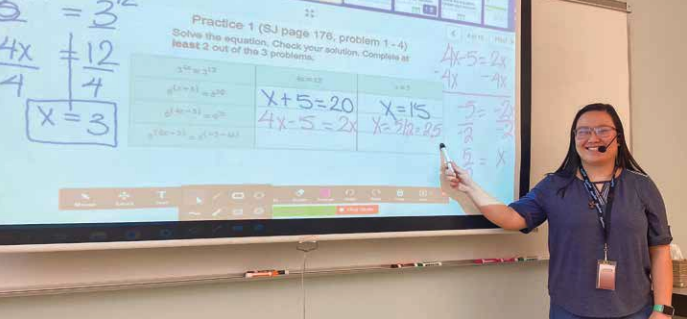Science and math teachers can be transformative figures in children’s lives. Having a teacher who has expert knowledge in the subject matter they are teaching and a passion for their work can increase a student’s curiosity and creativity in science, technology, engineering, and math. By encouraging scientific curiosity and literacy, teachers are giving kids important life tools, including the ability to think critically, problem-solve, and communicate complex information.
 “When people have scientific literacy, they are more prepared to be engaged community members and make informed decisions to make their world a better place,” said Meena Balgopal, professor in the Department of Biology. For the past 10 years, the College of Natural Sciences has been involved with the Robert Noyce Teacher Scholarship Program through the National Science Foundation.
“When people have scientific literacy, they are more prepared to be engaged community members and make informed decisions to make their world a better place,” said Meena Balgopal, professor in the Department of Biology. For the past 10 years, the College of Natural Sciences has been involved with the Robert Noyce Teacher Scholarship Program through the National Science Foundation.
This program, combined with specific curriculum designed for STEM teachers, supports teachers through their education and in their first few years on the job.
“STEM teachers are expected to do a lot. They must increase both content knowledge and competencies of their students, while also increasing their students’ confidence and sense of belonging in STEM disciplines, all while managing a classroom and building a community for the students,” said Balgopal, who is a principal investigator on numerous Noyce grants.
Through the Noyce Scholarship program, teachers are paired with mentors and join a national community of practice that they can reach out to as they begin their careers. The program also provides financial support and a way for teachers to submit data back to CSU so researchers can track teaching best practices.
“After receiving the Noyce Scholarship while at CSU, I was able to attend many different conferences and meet teachers from around the country,” said ThanhTu Nguyen, a Noyce Scholarship recipient who is now a math teacher at Mountain Range High School in Westminster, Colorado.“Through these Noyce conferences, I have learned many skills and resources that support my teaching career. I have also met many scholars who I still keep in touch with, and I’m thankful to the Robert Noyce Foundation for it.”
Nguyen’s first year of teaching was during the beginning of the COVID-19 pandemic. This presented many challenges, including the need to teach in remote and hybrid environments.
“The pandemic brought many changes to the school year, and my most difficult challenges were adapting to the different learning models. At times, I was fully remote, and other times I taught hybrid where students were both in person and online,” said Nguyen.
Now that her classes have moved back to fully in person, Nguyen says that she is enjoying seeing the kids in class. “My most memorable part of the year was watching students getting excited coming to math class and rolling their eyes at my math jokes,” said Nguyen.